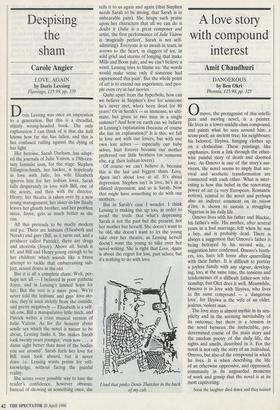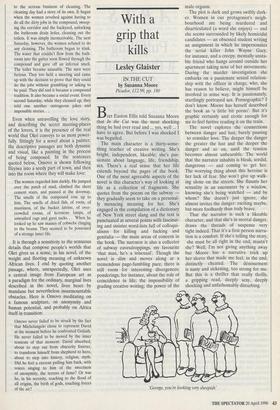A love story with compound interest
Amit Chaudhuri
DANGEROUS by Ben Okri Phoenix, £15.99, pp. 325 Omovo, the protagonist of this intelli- gent and moving novel, is a painter. He lives in a lower-middle-class compound, and paints what he sees around him: a scum-pool; an ancient tree; his neighbours; his beloved, Ifeyiwa, hanging clothes up on a clothesline. These paintings, like epiphanies, form a link through the other- wise painful story of death and doomed love. As Omovo is one of the story's sur- vivors, the novel seems to imply that sur- vival and aesthetic transformation are connected with each other. What is inter- esting is how this belief in the renovating power of art (a very European, Romantic notion), central to the novel and perhaps also an indirect comment on its raison d'être, is shown to sustain a struggling Nigerian in his daily life.
Omovo lives with his father and Blackie, his father's wife. His mother, after several years in a bad marriage, left when he was a boy, and is probably dead. There is always a suggestion that Omovo's father is being betrayed by his second wife, a suggestion later confirmed. Omovo's broth- ers, too, have left home after quarrelling with their father. It is difficult to portray a joyless family with any vigour, develop- ing, too, at the same time, the tensions and tendernesses of a difficult father-son rela- tionship, but Okri does it well. Meanwhile, Omovo is in love with Ifeyiwa, who lives in the same compound — a 'dangerous love', for Ifeyiwa is the wife of an older, jealous, violent man.
The love story is almost mythic in its sim- plicity and in the seeming inevitability of its outcome; but there is a tension in the novel between the ineluctable, pre- determined course of the main story and the random poetry of the daily life, the sights and smells, described in it. For the novel is not only the story of an individual, Omovo, but also of the compound in which he lives. It is when describing the life of an otherwise oppressive, and oppressed, community in its unguarded moments of work and gossip that the novel is at its most captivating: Soon the laughter died down and they turned to the serious business of cleaning. The cleaning day had a story of its own. It began when the women revolted against having to do all the dirty jobs in the compound, sweep- ing the corridor and the backyard, unlocking the bathroom drain holes, cleaning out the toilets. It was simply inconceivable. The next Saturday, however, the women refused to do any cleaning. The bathroom began to stink. The water that couldn't flow from the bath- room into the gutter soon flowed through the compound and gave off an infernal smell. The toilet became unusable. The men were furious. They too held a meeting and came up with the decision to prove that they could do the jobs without grumbling or asking to be paid. They did and it became a compound tradition. It also became a social event. Every second Saturday, while they cleaned up, they told one another outrageous jokes and impossible stories.. .
Even when unravelling the love story, and describing the secret meeting-places of the lovers, it is the presence of the real world that Okri conveys to us most power- fully. fittingly for a novel about a painter; the descriptive passages are both dynamic and visual, like a painting in the process of being composed. In the sentences quoted below, Omovo is shown following Ifeyiwa into a seedy part of town, and then into the room where they will make love:
The women regarded him darkly. He jumped over the patch of mud, climbed the short cement stairs, and paused at the doorway. The smells of the compound rose up to him. The smells of dried fish, of roots, of mustiness, of the bucket latrine, of over- crowded rooms, of kerosene lamps, of unwashed rags and garri sacks. . . When he looked up he saw masses of cobwebs clinging to the beams. They seemed to be possessed of a strange inner life.
It is through a sensitivity to the sensuous details that compose people's worlds that Okri gives us a sense, in his novel, of the weight and fleeting meaning of unknown African lives. I end by quoting another passage, where, unexpectedly, Okri uses a central image from European art as a paradigm for the ordinary, marginal lives described in the novel, lives beset by mundane but nevertheless insurmountable obstacles. Here is Omovo meditating on a famous sculpture, on anonymity and human potential, and probably on Africa itself in transition:
Omovo never failed to be struck by the fact that Michelangelo chose to represent David at the moment before he confronted Goliath. He never failed to be moved by the inner tensions of that moment: David absorbed, about to step out from obscurity forever, to transform himself from shepherd to hero, about to step into history, religion, myth. Did he feel a current pulling him back, with voices singing to him of the sweetness of anonymity, the terrors of fame? Or was he, in his serenity, reaching to the flood of all origins, the birth of gods, touching forces of the air?



































































 Previous page
Previous page